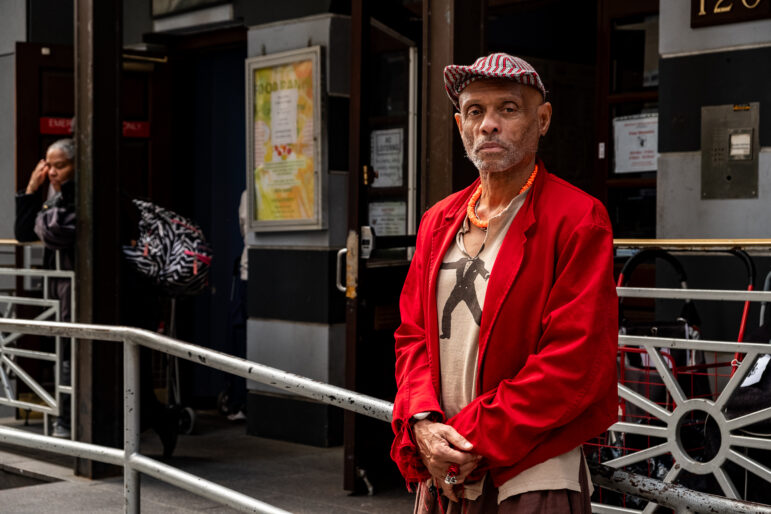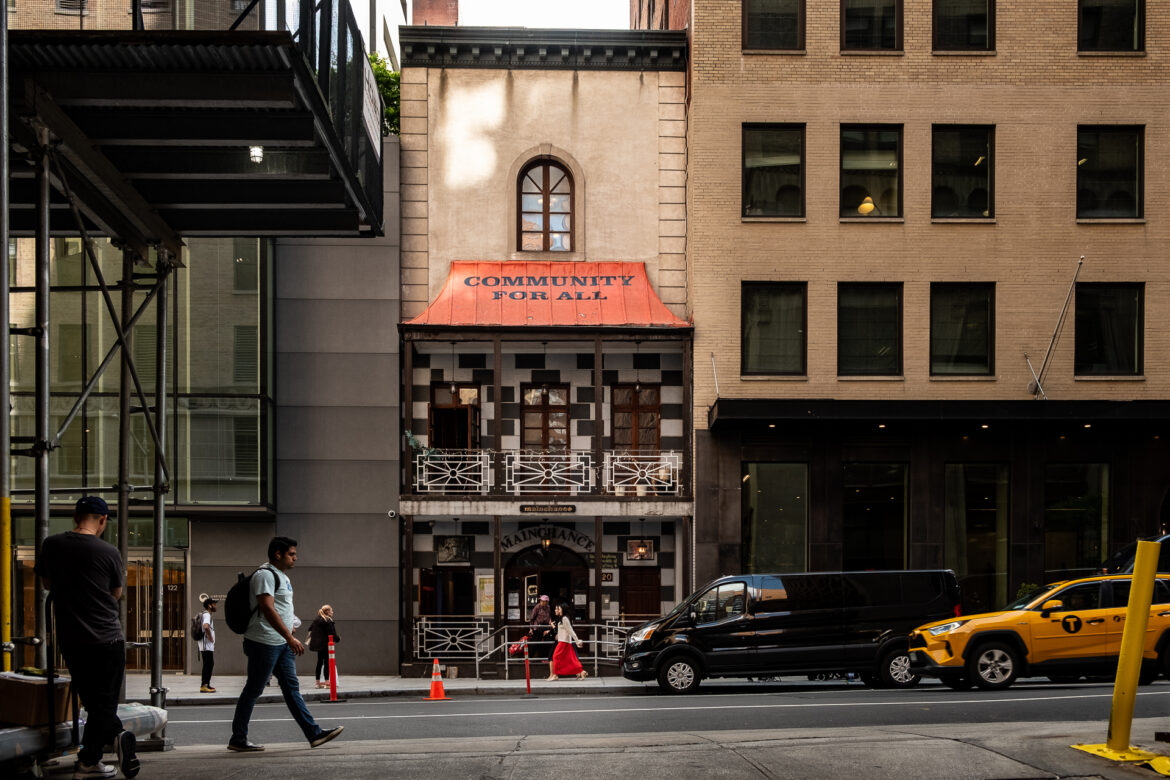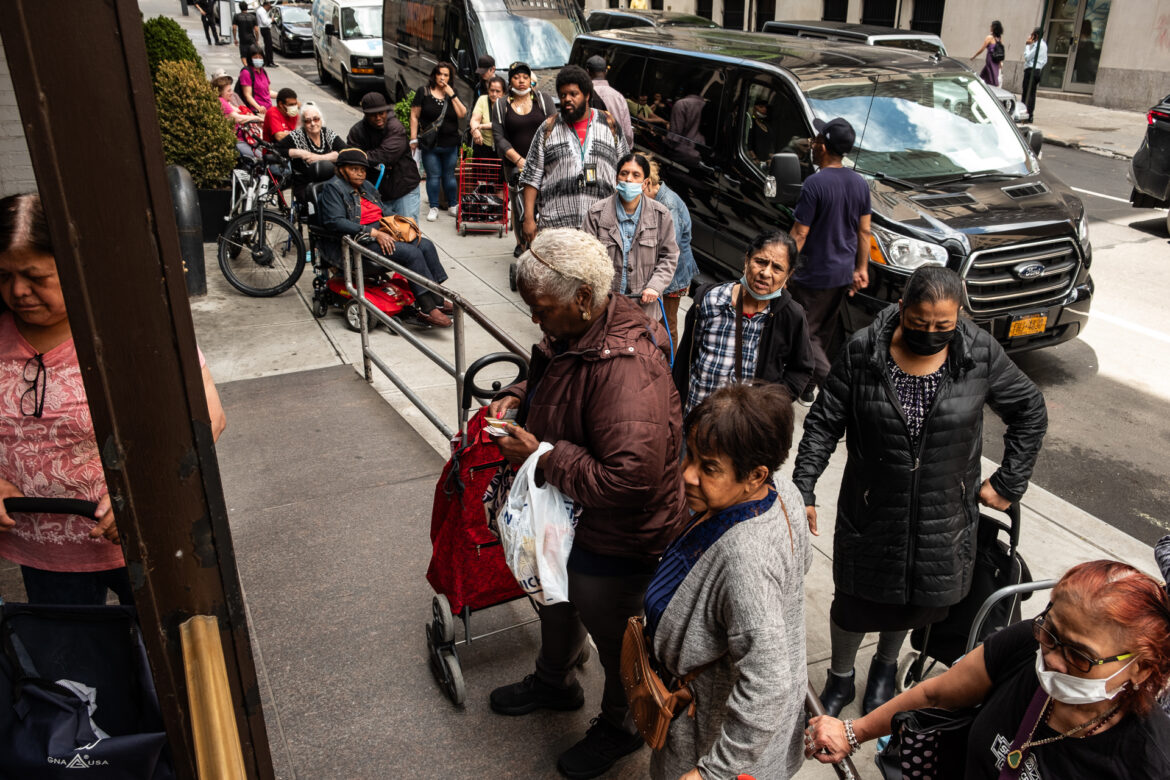A state judge has agreed to hear arguments in late July, protecting the Midtown East site at least temporarily beyond the city’s planned June 30 contract termination.

Adi Talwar
Mainchance Director Brady Crain outside the Midtown East building in May.Mainchance, a drop-in homeless center in Midtown East, will maintain its funding at least a few weeks beyond June 30—when the city planned to terminate it—while a state court judge considers a lawsuit arguing that ending the facility’s contract would be “premature and baseless.”
At a brief court appearance held virtually Tuesday morning, Judge Lynn Kotler said she would issue a restraining order temporarily continuing the contract and associated funding, criticizing lawyers for Mayor Eric Adams’ administration for not seeming “interested in working out anything.”
She also set a hearing date for July 23. Brady Crain, the center’s director, expressed relief in a subsequent phone call. “I’m delighted. We won a temporary stay but there’s still a fight,” he told City Limits.
Mainchance and its operator, Grand Central Neighborhood Social Services Corporation (GCNSSC), filed suit on June 5, after receiving a letter from the Department of Homeless Services (DHS) in May confirming the city’s plans to end Mainchance’s funding two years before its current contract is set to expire.
“The city has made a decision to go a different way, which it’s entitled to do,” Blake Alhberg, assistant corporation counsel, told Judge Kotler Tuesday.
Mainchance and GCNSSC are simultaneously appealing the city’s decision administratively, and filed the suit in an attempt to preserve funding while that potentially months-long process plays out. Today’s order signals the court may support that effort, according to Mainchance board member and attorney Marc Gross, who is representing the site and GCNSSC pro-bono.
“This judge made it very clear that she could very well keep the center open by our having to exhaust administrative remedies through the comptroller’s office,” he said.
“We were very pleased with the court’s understanding of the wider context of this case and the homeless crisis that the city is facing and the need to address it with dignity for the clients,” he added.
New York City’s homeless population has been at record highs this year, with an estimated 147,000 people staying in city shelters in April.
Founded in 1989, Mainchance has operated for over 20 years in a four-story building on East 32nd Street, an upscale office district off of Park Avenue.

Adi Talwar
The Mainchance Drop-in Center, located on East 32nd Street between Park and Lexington avenues in Manhattan, has been there for the last 20 years. It’s expected to close at the end of June.Drop-in centers don’t have beds. At Mainchance, overnight guests can sleep in large plastic adirondack-style chairs on the second floor, in a high-ceilinged room with a balcony.
In addition to relief from the elements, Mainchance provides housing-related counseling and medical care, plus meals, showers and a monthly food pantry. Its lawsuit touts over 45,000 visits and 70,000 meals served during the year ending in June 2023.
Clients deserve continuous support rather than being “pushed off” to other homeless shelters, Gross said while making his case to the judge Tuesday.
Preliminary city budget documents describe Mainchance as “underperforming” and state that it will be replaced with new sites. The closure would save $3.7 million in Fiscal Year 2025, and an additional $10.2 million in the out-years, documents show.
Yet DHS’ May 8 letter to Mainchance says the contract is being terminated “without cause.” Mainchance received “excellent” or “good” ratings on all performance audit metrics from 2021 to 2023, according to court records. And the city has confirmed that no other drop-in center closures are planned this budget cycle.
“Why is this site different from all other sites?” Gross asked the court Tuesday.
According to Mainchance’s lawsuit, the closure is all the more puzzling because the organization has sought to convert to a hybrid Safe Haven facility.
Unlike drop-in centers, Safe Havens have beds. These sites are distinct from traditional shelters, in that they have a low barrier to entry and aim to appeal to street homeless New Yorkers. Mainchance’s proposal calls for over 25 beds and 30 lounge chairs.
Gross pointed to a March email from Ellery Gillette, assistant commissioner of capacity planning and development at DHS, stating that “DHS does not want to operate a drop-in at this site” but would review a “viable” proposal to convert the facility into a Safe Haven.
Construction could be completed in three months for less than $500,000, within the organization’s current budget, Gross added. Yet messaging around the hybrid proposal has been confusing. Even if approved, renovations would only be possible with a continued contract, which the city seems determined to end.
If funding is cut off, Gross said, Mainchance will lose its lease and have to fire its staff and “most importantly the homeless are going to be sent back on the street.”

Adi Talwar
People lining up in front of the Mainchance Drop-in Center for its monthly food pantry food in May.In a statement last week, after Mainchance filed suit but before the parties appeared in court, a Department of Social Services (DSS) spokesperson said that the Adams administration is working “aggressively” to expand low-barrier shelters, including both Safe Havens and drop-in centers.
A new drop-in center is opening in Manhattan this summer, according to DSS, which will bring the borough’s total to three.
Neither Mayor Adams’ press team, nor the City Law Department, immediately replied to a request for comment on Tuesday’s court outcome.
Crain, Mainchance’s executive director, said afterwards that he did not go into the hearing with firm plans to shut down on June 30, instead holding out hope for some sort of intervention.
“They thought we were a little agency and we were just gonna bow out and we showed them,” he said.
To reach the reporter behind this story, contact Emma@citylimits.flywheelstaging.com. To reach the editor, contact Jeanmarie@citylimits.flywheelstaging.com
Want to republish this story? Find City Limits’ reprint policy here.








